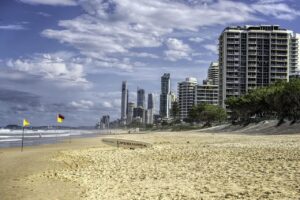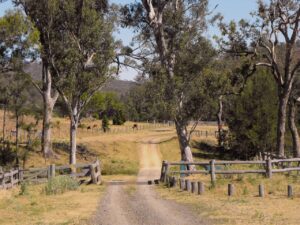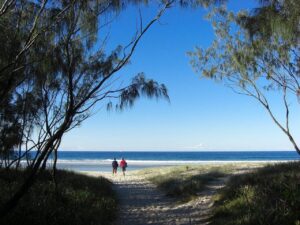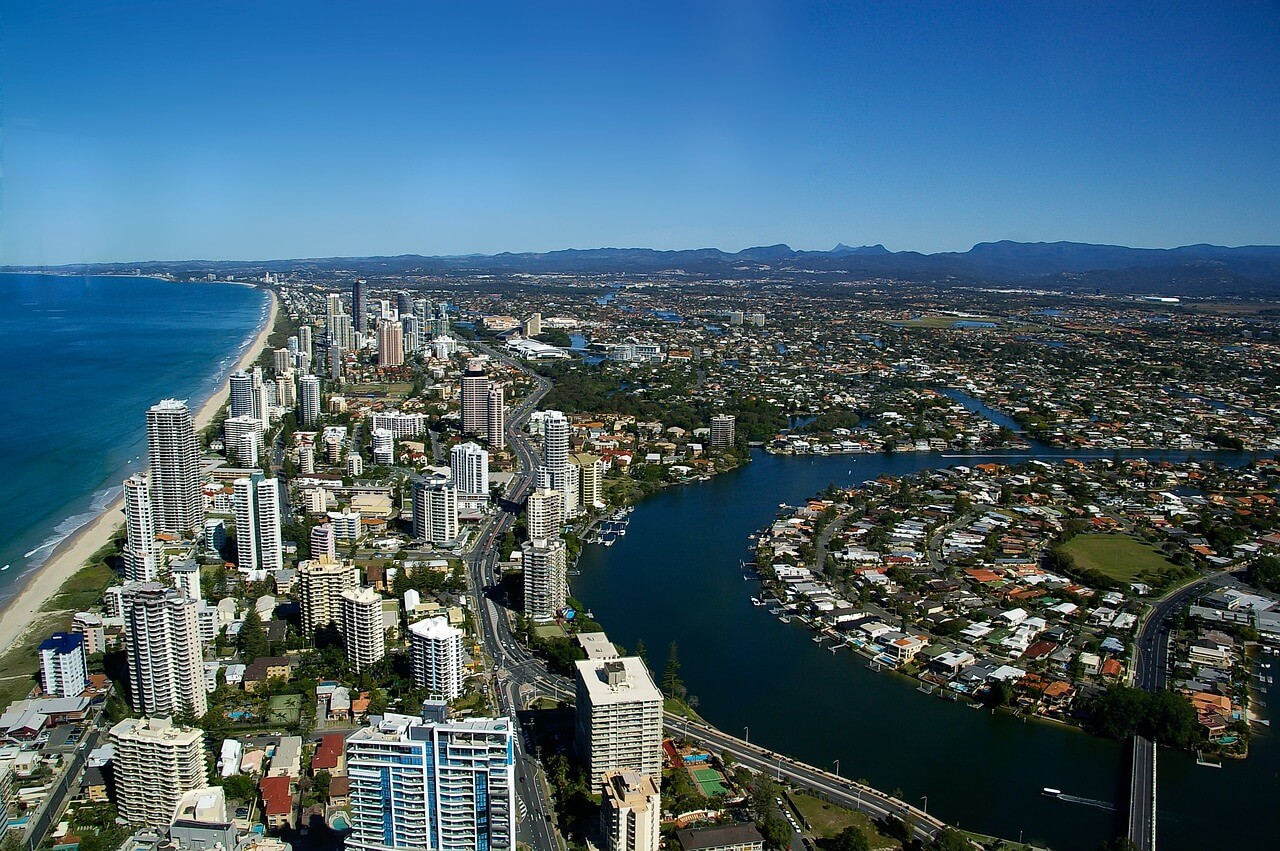Contents
- 1 Queensland: A Modern State for Tourism and a Great Lifestyle Introduction
- 2 What is Queensland and Why Is It Important to Discuss?
- 3 Geography and History
- 4 Weather and Environment
- 4.1 What’s the Climate Like in Sunshine State? When’s the Best Time to Visit?
- 4.2 How Often Do Natural Disasters Occur in Queensland and How Are They Managed?
- 4.3 What Environmental Protection Measures Are in Place in Queensland?
- 4.4 Population and Culture
- 4.5 Diet and Lifestyle
- 4.6 Education and Employment
- 5 Which Jobs Are in High Demand in Queensland?
- 6 Business and Economy in Queensland
- 7 Online Work and Freelancing in Queensland
- 8 Government Support for Foreign Entrepreneurs
- 9 Housing and Transport
- 10 Healthcare and Safety
- 11 Immigration and Residency
- 12 Social Life and Community
- 13 Famous Figures and the Future of Queensland
- 14
Queensland: A Modern State for Tourism and a Great Lifestyle
Introduction
Today, I will share insights into one of the world’s most modern states—Queensland. We’ll explore the place through the perspective of Henry, a proud Sunshine State local who often shares stories about his home. Based on his accounts, here’s what I’ve gathered.
In the north-eastern part of Australia, the Sunshine State’s capital is Brisbane—the country’s third-largest city. In terms of land area, it’s the second-largest state in Australia, covering around 1,852,642 square kilometers.
Sunshine State is rich in biodiversity. It’s home to the world-famous Great Barrier Reef, the largest coral reef system on Earth. The state also features numerous tropical rainforests and wildlife sanctuaries. The climate is typically warm and humid, tropical and subtropical.
Economically, Queensland is quite advanced. It generates significant revenue from agriculture, mining, tourism, and education. Cattle and sheep farming, sugarcane production, and mineral exports are especially popular.
Tourist Attractions:

Queensland boasts popular destinations like the Gold Coast, Sunshine Coast, Daintree Rainforest, Whitsunday Islands, and Fraser Island.
But beyond the well-known spots, there are unique experiences such as:
Cardwell UFO Festival, Birdsville Races, Jumpers & Jazz in July, Sunshine State Outback lifestyle, small towns (Roma, Charleville, Cooktown, Stanhope), natural disaster safety (cyclones, floods, sunburns), health tourism, student life, Aboriginal art and heritage, the local economy and job scene, tourist dos and don’ts, and eco-tourism.
We’ll explore all these topics in detail on our website, so stay tuned for more posts.
Cultural Festivals:
Queensland celebrates many major festivals annually, including the Brisbane Festival, Cairns Indigenous Art Fair (CIAF), Gold Coast Film Festival, Sunshine State Music Festival, Woodford Folk Festival, Toowoomba Carnival of Flowers, Paindiri Greek Festival, Mount Isa Rodeo, Australian Italian Festival, and the Palm Island Festival.
Sports and Outdoor Lifestyle:
Henry often expresses his pride in Queensland’s sporting culture. The state has produced several world-renowned athletes, including:
Allan Border, Greg Chappell, Ian Healy, Matthew Hayden, Ashleigh Barty, Samantha Stosur, Johnathan Thurston, Wally Lewis, Cathy Freeman, and Grant Hackett.
Education & Population:
As of 2025, Queensland’s estimated population exceeds 5.4 million.
It’s home to globally recognized universities like the University of Sunshine State (UQ), Queensland University of Technology (QUT), and Griffith University.
With its lifestyle, education, and travel opportunities, Sunshine State is truly an incredible destination—and possibly a perfect place for the future.
What is Queensland and Why Is It Important to Discuss?
Queensland is one of the largest states in Australia—not just in terms of size, but also in terms of economy, culture, and tourism. It’s important to talk about Sunshine State because it’s one of Australia’s most fascinating and diverse regions. From the world-famous Great Barrier Reef to stunning beaches, vibrant cities, and lush rainforests, Queensland has it all. Learning about Sunshine State can help you make smart decisions around travel, education, living, or even doing business in the state.
Geography and History
Where is Queensland Located and How Is It Different from Other Australian States?
Queensland is located in the north-eastern part of Australia. It’s bordered by the Pacific Ocean to the east, the Northern Territory to the west, and New South Wales to the south. In terms of land area, it’s Australia’s second-largest state. Thanks to its mostly sunny climate all year round, it’s often called the “Sunshine State.”
What makes Sunshine State different from other states is its rich biodiversity and the number of natural attractions that draw tourists from all over the world.
How Was Queensland Formed and What’s the Story Behind Its Name?
Queensland was originally part of New South Wales. It became a separate colony in 1859 and was named in honor of Queen Victoria—combining the words “Queen” and “land” to form Queensland.
Historically, the formation of Sunshine State was part of broader political and social changes that aimed to better protect local communities and make settlement easier in the growing northern region.
What Are Queensland’s Major Cities and What Are They Known For?
- Brisbane – The capital city and the largest in Queensland. Known for modern city life, excellent education, and job opportunities.
- Gold Coast – A coastal paradise, famous for surfing, beaches, theme parks, and high-rise living.
- Cairns – Gateway to the Great Barrier Reef and a popular hub for nature-based tourism.
- Townsville – Known for being a military and research center, with access to the outback and the reef.
- Sunshine Coast – A peaceful, nature-filled area known for relaxed coastal living and beautiful national parks.
Weather and Environment
What’s the Climate Like in Sunshine State? When’s the Best Time to Visit?
Queensland generally has a warm and humid climate. The northern part has a tropical climate (hot and wet), while the southern part has a subtropical climate (mild winters and warm summers).
The year is typically divided into two main seasons:
- November to April – Hot and rainy (wet season).
- May to October – Cooler and drier (dry season), making it the best time for travel, especially if you’re planning to explore the Great Barrier Reef or national parks.
How Often Do Natural Disasters Occur in Queensland and How Are They Managed?
Sunshine State experiences natural disasters like cyclones, floods, and bushfires, especially during the wet season.
However, the state government is well-prepared. They use modern technologies and run public awareness campaigns to ensure people are alert. Emergency response teams act quickly, evacuation shelters are provided, and people are educated on how to stay safe.
What Environmental Protection Measures Are in Place in Queensland?
Queensland takes its environment seriously. Some major efforts include:
- Great Barrier Reef protection programs
- Rainforest and national park conservation
- Waste reduction and recycling programs
- Eco-tourism initiatives
- Climate change awareness campaigns
Travel and Tourism
What are the top 10 tourist attractions in Queensland?
- Great Barrier Reef
- Gold Coast and its beaches
- Sunshine Coast
- Daintree Rainforest
- Fraser Island
- Whitsunday Islands
- Brisbane River Cruise
- Koranda Scenic Railway
- Lamington National Park
- Australia Zoo
What is the Great Barrier Reef and why is it a source of pride for Queensland?
The Great Barrier Reef is the world’s largest coral reef system, located off the coast of Queensland. Stretching over 2,300 kilometers, it comprises more than 2,900 individual reefs and over 900 islands. Recognized as a UNESCO World Heritage Site, it’s not just an Australian treasure but a global natural wonder. It’s incredible biodiversity and beauty make it one of Sunshine State’s greatest sources of pride.
How popular is ecotourism in Queensland, and how is it environmentally friendly?

Ecotourism is highly popular in Sunshine State. Travellers enjoy the natural beauty without harming the environment. Examples include eco-friendly lodges, use of solar energy, waste reduction, respect for local cultures, and conservation of natural resources. It also supports the livelihoods of local communities.
Important travel tips for tourists in Queensland:
- Wear light, comfortable clothing for the warm climate
- Use sunscreen
- Be cautious during cyclone season (November to April)
- Avoid littering and help protect nature
- Show respect to local cultures and Indigenous communities
- Follow advice from tour guides and travel safely
Population and Culture
What is the demographic makeup and diversity of Queensland?
Queensland has a population of around 5.1 million. While a large portion of residents are of European descent, the state is home to people from Asian, African, and Middle Eastern backgrounds. One of its most significant aspects of diversity is its Indigenous communities, who have preserved their culture for thousands of years. Sunshine State is a multicultural melting pot where various languages, religions, and lifestyles coexist.
How important is Indigenous culture in Queensland?
Indigenous culture holds a place of deep respect in Sunshine State. Indigenous contributions in education, tourism, arts, and music are widely recognized. Their history and languages are taught in schools and communities. Governments and local organizations run several initiatives to preserve Indigenous culture, such as art festivals and Dreamtime story exhibitions.
What cultural festivals are celebrated in Queensland?
Queensland hosts numerous cultural festivals year-round, including:
- Brisbane Festival – featuring music, dance, and fireworks
- Cairns Indigenous Art Fair – a leading event for Indigenous art
- Gold Coast Multicultural Festival – showcasing food, fashion, and music from various ethnic communities These festivals highlight Sunshine States rich and diverse culture.
What is the lifestyle and core values of Queenslanders?
Queenslanders typically enjoy a relaxed, nature-oriented lifestyle. They are friendly, welcoming, and health conscious. Valuing time, hard work, and family is central to their way of life. Many spend their leisure time at the beach or hiking in the mountains.
Diet and Lifestyle
What are some popular local foods and recipes in Queensland?
Some well-known Sunshine State dishes include:
- Moreton Bay bugs (a type of seafood)
- Barramundi (a native fish)
- Lamingtons (sponge cake dessert coated in chocolate and coconut)
- Pavlova (a meringue-based dessert topped with fruit) Local produce such as mangoes, pineapples, and sugarcane is also used in various recipes. Seafood is particularly popular across the state.
How do everyday people in Queensland live and manage expenses?
The cost of living in Sunshine State is generally lower compared to other Australian states. Rent, transport, groceries, and daily expenses are manageable for those on a middle income. While cities like Brisbane are more expensive, smaller towns and coastal regions are more affordable. Health and education services are highly developed and heavily subsidized.
What halal food and facilities are available for Muslim travelers?
Queensland offers good support for Muslim travelers. Cities like Brisbane, Gold Coast, and Cairns have numerous halal restaurants and stores. Halal products are also available in many supermarkets. Additionally, there are mosques, Islamic centers, and strong Muslim communities who provide support to visitors.
Education and Employment
What is Queensland’s education system like, and what are some renowned universities?
Sunshine State offers a world-class education system from primary school through to university. Some of the top universities include:
- The University of Queensland (UQ)
- Sunshine State University of Technology (QUT)
- Griffith University These institutions are known for their research excellence and support for international students.
How affordable and manageable is student life in Queensland?
Student life in Sunshine State is relatively manageable. Options such as student hostels, shared housing, and discounted public transport are available. Many places also offer student discounts. While the cost of living is slightly higher in larger cities, students can still live independently with proper budgeting.
How can students find part-time work in Queensland?
Finding part-time work is fairly easy for students in Sunshine State. Opportunities are available in restaurants, retail, call centers, and delivery services. University career support centers also assist with job searches. Online platforms such as SEEK and Indeed frequently list part-time vacancies.
Which Jobs Are in High Demand in Queensland?
Sunshine State offers excellent job opportunities across several industries. Some of the most in-demand professions include:
- Healthcare – such as nurses, physiotherapists, aged care workers
- Construction – tardies, builders, and site managers
- Information Technology (IT) – software developers, cybersecurity experts
- Agriculture and Farming – farmhands, machinery operators
- Tourism and Hospitality – chefs, hotel staff, tour guides
These sectors have a consistent demand for skilled professionals, including international workers, with many roles offering pathways to permanent residency.
Business and Economy in Queensland
How Is Queensland’s Economy Structured?
Sunshine State has a diverse and strong economy. Key industries include:
- Agriculture – cattle farming, crop production (pineapples, mangoes, coffee)
- Mining – coal, natural gas, and minerals
- Tourism – iconic destinations like the Great Barrier Reef, the Gold Coast, and Tropical North Sunshine State attract millions of visitors
- Technology and Innovation – especially booming in Brisbane and the Gold Coast
Are There Investment Opportunities for Foreigners?
Yes. Queensland welcomes foreign investment, especially in sectors like:
- Agriculture
- Real Estate
- Technology and StartupsThe government offers various incentives, such as business and investor visas, tax benefits, and support programs. With the right research and planning, it’s a promising location to launch or grow a business.
Online Work and Freelancing in Queensland

Sunshine State’s lifestyle, combined with affordable living costs, makes it a great place for remote work. Popular freelancing sectors include:
- Web and Graphic Design
- Content Writing
- Software Development
- Digital MarketingPlatforms like Upwork, Fiverr, and Freelancer.com offer access to global clients. Many Queenslanders work online, either as freelancers or running their own digital businesses.
Government Support for Foreign Entrepreneurs
The Queensland Government provides a range of supports for international business owners:
- Invest Sunshine State – offers advice and information to overseas investors
- Grants and Funding – available for certain industries and startup businesses
- Startup Hubs and Incubators – offer coworking spaces, mentorship, and networking opportunitiesThese resources are designed to help foreign entrepreneurs establish and scale their businesses in Sunshine State.
Housing and Transport
How Easy Is It to Find Accommodation in Queensland?
Finding a place to live is generally straightforward. However, rent in major cities like Brisbane or the Gold Coast can be higher than in regional towns.
- In Brisbane, a 1-bedroom apartment in the city center may cost AUD $1,500–$2,000/month
- In regional towns, rent is usually lowerWebsites like Domain and realestate.com.au make house-hunting easier.
How Is the Public Transport System?
Queensland has a reliable public transport network:
- Brisbane – trains, buses, ferries with TransLink integration
- Gold Coast – trams and buses
- Cairns – mostly busesBrisbane is considered the most convenient for getting around, especially for new arrivals.
Healthcare and Safety
Is the Healthcare System Good?
Queensland has a world-class healthcare system. It includes:
- Public hospitals – covered by Medicare for eligible residents
- Private facilities – faster access with private health insurance
- Clinics and GPs – easily accessible in both cities and rural areasThe system is modern, efficient, and staffed by qualified professionals.
Is Queensland Safe?
Overall, Sunshine State is considered safe. While petty crimes like theft may occur in some areas, violent crime rates are relatively low.
- Urban areas like Brisbane have good police presence
- Most suburbs are safe for families and individuals
- Drug-related and alcohol-related incidents exist but are generally under controlUsing common sense, such as avoiding isolated areas late at night, ensures a safe experience.
Immigration and Residency
Is It Easy for Foreigners to Live in Queensland?
Sunshine State is known for its multicultural society. It’s relatively easy for newcomers to settle in, especially those who come to:
- Work
- Study
- Start a businessThere are many community groups and support networks to help with housing, employment, and integration.
What Visa Is Required to Settle Permanently?
To live permanently in Queensland, you’ll generally need one of the following:
Skilled Migration Visa (subclass 189/190/491)
Employer-Sponsored Visa
Student Visa (with pathways to residency)
Partner or Family Visa
You must meet skill, work, or family requirements, and in some cases pass health and English proficiency tests.
What’s the Process to Move to Queensland?
- Determine your visa type (e.g., tourist, student, skilled worker)
- Prepare documents – passport, education/work records, health checks
- Apply online via the Department of Home Affairs
- Attend biometrics or interviews if required
- Receive visa and plan your moveMany people start with a student or work visa, then transition to permanent residency.
Social Life and Community
How Do Queenslanders Treat Newcomers?
Sunshine State are known for being friendly, laid-back, and welcoming. Multiculturalism is embraced, and many communities actively support new arrivals with:
- Cultural associations
- Language support
- Community events
What Rights and Opportunities Do Women Have?
Queensland strongly supports gender equality. Women enjoy:
- Equal employment rights
- Legal protection from discriminationPrograms that support women in business and leadershipWomen participate freely in all aspects of public life.
What’s the Muslim Community Like in Sunshine State?
Queensland’s Muslim community is active and well-integrated. Facilities include:
- Mosques and Islamic centers
- Halal food options
- Islamic schools and community groups
Major cities like Brisbane and Logan have strong Muslim populations and regular religious and cultural events.
Famous Figures and the Future of Queensland
Notable People from Sunshine State
Queensland has produced many influential Australians, such as:
- Cathy Freeman – Olympic gold medalist
- Wayne Bennett – legendary rugby league coach
- Annastacia Palaszczuk – Premier of Sunshine State
- Geoffrey Rush – Oscar-winning actor
- Julian Assange – founder of WikiLeaks (raised in Sunshine State)These individuals have shaped sports, politics, the arts, and global culture.
What Is Queensland’s Future Development Plans?
Sunshine State is planning for:
- Sustainable energy – investment in solar, wind, and bioenergy
- Eco-tourism – growing green travel options around the Great Barrier Reef and national parks
- Smart cities – digital infrastructure to support modern living
- 2023–2032 Brisbane Olympics preparations – major developments in transport, stadiums, and accommodation
Conclusion
Whether you’re planning to live, study, or travel in Queensland, it’s a state that truly offers the best of all worlds. From high-quality healthcare and world-class education to a safe and relaxed lifestyle, Sunshine State is ideal for people who value balance, nature, and opportunity.
However, before making your final decision, it’s important to consider how well Sunshine State aligns with your personal lifestyle, career goals, housing budget, and transport needs. If you’re seeking a green, modern, and secure place to live—Sunshine State could be a perfect choice.

Hi, I’m bristly khatun from Bangladesh. I housewife and started a website. I love traveling around Australia. On HaleBoop.com, I share my simple travel stories and experiences from all over the country.
